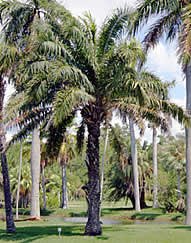African palm oil: A profitable business in West Africa
Today he wanted to join the community of Steemchur, to support such an important project of @FARM, led by @sirknight. My theme is: African palm oil.

Source
AFRICAN PALM OIL.
Palm oil is an oil of vegetable origin that is extracted from a nut of the plant called elaesis guineensis. The plant is native to western Guinea. The oil palm to sow it would take from 3 to 4 years to have its first harvest the plant can reach 20 meters in height and the nut cluster up to 20 kilos.

Source
APPLICATIONS

Source
It is used as oil for frying or as products to make margarines, ice cream.
DERIVATIVES:
It is present in the manufacture of soaps, toothpastes, etc.
IN THE INDUSTRY:
Raw material to make biodiesel, greases, lubricants, dyes for printer.
THE PALM OF OIL IN THE WORLD
Palm oil ranks second in world production of oils and fats, palm oil exports account for 70% of the world's production.
PRODUCER COUNTRIES:
Nigeria: This country has the largest palm production in Africa with 2.5 million hectares, considered the largest producer of the basic product in Africa and the third in the world.
Ivory Coast: In this country the palm production is below that of Nigeria, where the oil is not used only for frying but in local dishes from gombos, sauces, dishes made with bananas.
Cameroon: The oil palm in this country as raw material for the preparation of indigenous remedies; They use palm leaves for caries treatment and palm wine is mixed with remedies for male impotence.
The production of the African palm and the environmental impact
The expansion of oil palm cultivation in Africa, has a significant impact on the environment, since these plantations are replacing 50% of tropical forests, this crop has generated devastating consequences in the land, you can see large infertile hectares that In the long term, the lands are weakened, losing their agricultural capacity for many years.
African plant production cycle
The oil palm begins to diminish its production at approximately 25 years; there are those who defend the assistance of the plantations because they generate jobs.
Economic importance
West Africa used to be the center of the palm oil industry. The export of palm seeds began in 1832 and by 1911 the "British" West Africa exported 157,000 tons of which 75 percent came from Nigeria. In the 1870s, British managers moved the plant to Malaysia and in 1934 that country surpassed Nigeria as the largest exporter of this product. By 1966, Malaysia and Indonesia had exceeded the total palm oil production in Africa.
In Nigeria, oil palm is native to the coastal plain and migrated inland as a staple crop. 80% of the production comes from several million small farmers scattered on a surface that is estimated to cover approximately between 1.65 million hectares and 3 million hectares at most. For millions of Nigerians, the cultivation of oil palm is part of their way of life - in fact, it is part of their culture.
New perspectives of the African palm
The possibilities offered by oil and palm fruit for animal nutrition, and especially for porcine nutrition, are very good since they make a sustainable use of the byproducts of the extraction process.
In the future, African palm, a species that easily captures solar energy, can be integrated into animal production with a systemic approach that will allow achieving high efficiency and quality in nutrition. The extraction of the oil will lend itself to alternative or intermediate uses. Likewise, the associated crops producing biomass, intended for animal consumption, in which the strategy of a multi-purpose agriculture will be implemented, will be profitable.
REFERENCES: https://wrm.org.uy/es/articulos-del-boletin-wrm/seccion2/palma-aceitera-en-nigeria-la-produccion-
You have a minor misspelling in the following sentence:
It should be in the long run, instead of in the long term,.Get your post resteemed to 72,000 followers. Go here https://steemit.com/@a-a-a